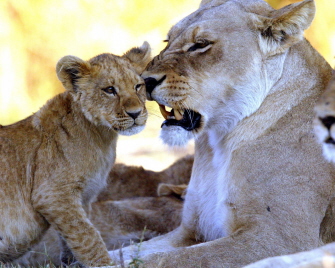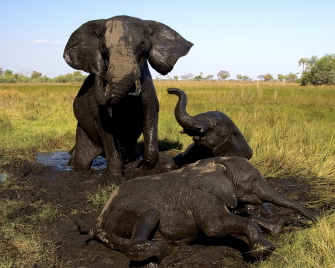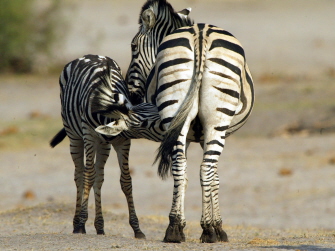By Susan Farewell
When you travel to Africa, you inevitably hear someone make reference to having safari eyes. What that basically means is seeing more. Two people can look out at the same savanna. One might see only grasslands rippling in the wind. The one with safari eyes might also see a jackal sitting in the grass, an eagle perched on a treetop, and the long necks of giraffes in the woodlands beyond.
Getting safari eyes is not some natural aptitude or an  acquired skill. It’s all about slowing down and paying attention to everything around you, using your eyes, your ears, your sense of smell. In general, your instincts—something we all have but kind of lose as we get tangled up in our packed day-to-day schedules, our ever-present electronics and our long-term agendas. acquired skill. It’s all about slowing down and paying attention to everything around you, using your eyes, your ears, your sense of smell. In general, your instincts—something we all have but kind of lose as we get tangled up in our packed day-to-day schedules, our ever-present electronics and our long-term agendas.
Several years ago, my then almost-13-year-old daughter and I spent the bulk of our 10-day trip through Botswana and Zambia, getting our safari eyes.
We had gone to Southern Africa with the cliché safari expectations: to see lions, elephants, leopards, zebra, giraffe and other animals in their natural habitat. With the exception of the rhino, we saw all of the high-profile (the new name for the original hunter’s title, the big five) animals. In fact, we saw them all very early on, very close up.
What I didn’t expect is that we’d see so much more, not only in the way of wildlife and plantlife, but of these countries and their people in general, and of each other.
We were on a Wilderness Safaris trip, which took us to four different luxury tented camps, via five Cessna flights and to and through some of the planet’s greatest wilderness areas. We visited the Kalahari Desert, the Okavango Delta and the Linyanti Reserve in Botswana and then moved on to Zambia, where we were based on the shores of the voluminous Zambezi River, not far from Victoria Falls, one of the Seven Natural Wonders of the World.
Over the course of the trip, we found ourselves rambling over bumpy plains in 4 x 4 Land Rovers, racing along in speedboats through watery channels lined with papyrus, and watching some of the most spectacular horizon-filling sunsets I’ve ever seen.
Lions, Hippos and Honey Badgers…Oh MY!
It being spring in Southern Africa, we were able to observe many newborns and young animals. We watched lion cubs play, as the mom sat protectively nearby. We saw many baboons grooming their little ones and scolding them when they got out of line. We had a  baby elephant try out his charging skills on us, by flapping his baggy ears, trying to look bigger than he was and rushing toward us—as his parents looked over. He got it all wrong. To really charge, you need to pin the ears back. baby elephant try out his charging skills on us, by flapping his baggy ears, trying to look bigger than he was and rushing toward us—as his parents looked over. He got it all wrong. To really charge, you need to pin the ears back.
But it wasn’t just sweetness and cuteness. While we didn’t see a kill, we couldn’t help but notice how stressful it must be to live in a world where you’re on everybody’s menu. Living like that, you use all your instincts and your body language to control matters. One morning, our jeep must have woken a hippo sleeping in the bulrush. Surprised, he flared his nostrils and glared at us, warning us not to come any closer. We inched away. While his size was certainly intimidating, we learned that here in the plains, it’s not just the size of an animal you need to worry about. It’s how aggressive and confident they are. In fact one of the most frightening creatures of them all weighs less than 30 pounds. It’s hard to imagine, considering its name, but the African honey badger, will go face to face with animals 5 times its size. With Its four-inch claws and indomitable nature, nobody gets in its way. Even the lions are so afraid of them, that the bushmen used the small animal’s scent around their camps at night to keep the big cats (and snakes) away.
Learning from the Locals
The best example of “safari eyes” was made stunningly clear to us one morning on the plains when we headed out for an early morning game drive with Zee, our guide at one of the camps. Minutes into the trip, he slowed the vehicle down, spotting tracks on the dirt road ahead.
“Lions,” he said, rubbing his hands together, excitedly.
The next two hours, we witnessed an extraordinary ability to track these cats. At times, we wondered if he was crazy, as seemingly randomly, he would abruptly turn the vehicle into the bush and forge on. Periodically he would quickly turn off the engine and hold up his hand, stopping us from talking so he could listen to the baboons, the birds and other species giving clues. When lions are lurking about, the whole savanna is on alert. Occasionally, he would connect with his fellow guides on the radio, who were all tracking them in adjacent areas. After a while, my daughter and I started to think it was just a long ride and gave up on the idea of seeing them.
And then it happened…right in front of us, there they were. Five lions, looking at us as if to say, “What took you so long? “ It was as if knowing Zee was our guide, they knew it would just be a matter of time before we found them.
Mom and Daughter Time
Being away from the routines of home, the trip gave my daughter and me countless opportunities to learn more about each other. One night, in an hours-long thunder storm (which though beautiful, looked as if it was electrocuting the entire African continent), I learned that my daughter has a greater sense of humor than I thought. While I was ramrod tense through the entire event, she was completely energized and seemingly thrilled by the drama of it all.
I also saw that she was a bit tougher than I am in many  circumstances. Another night, a growl (which turned out to be a baboon right outside the screen), catapulted me out of bed and sent me running for cover while she cooly said, “Mom, just go back to sleep.” circumstances. Another night, a growl (which turned out to be a baboon right outside the screen), catapulted me out of bed and sent me running for cover while she cooly said, “Mom, just go back to sleep.”
I also discovered that, if motivated, she will get up at 5:00 in the morning and not complain. Not sure if it had anything to do with the pre-dawn breakfasts, which—at some camps—were served around a bonfire, or the fact that the early game drives really did yield the most fruitful sightings.
Being alone together far from home also gave me the opportunity to help her process some of the “melancholies du voyage” or “the travelers woes” such as homesickness. One morning, about midday through the trip, we were driving along in a safari jeep through an area that looked almost biblical with sculpture-like leadwood trees, a couple of Greater Kudu with massive horns and wildly different birds everywhere. Though beautiful, home seemed very far away. Then we noticed the smell of sage in the air. As we both inhaled the piney scent, I casually mentioned that “When we get home, I’ll make a little sauce with sage, butter and garlic and we’ll have it over ravioli.” She smiled. But it wasn’t just the anticipation of a home-cooked meal that she was smiling about.
“Mom,” she said. “Thanks for bringing me here.”
Photo Credits: All of the above photographs were provided by Wilderness Safaris. The photo of the lions and the zebras was taken by Michael Poliza. The photo of the elephants was taken by Dana Allen.
|
|
|

